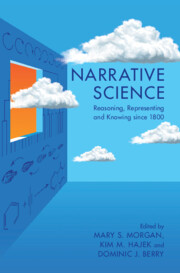Figures
3.2Graph of percentage extinction of fossil marine families for each geologic stage of the past 250 million years
3.3Stratigraphic ranges of 21 lineages (i.e., species genus Linnaeus) of ammonites found at Zumaya, Spain
4.2Ball-shaped accretionary lapilli on the surface of a Stac Fada Member outcrop
4.3Photomicrograph of a shocked quartz grain from the Stac Fada Member
4.4The impactoclastic emplacement of the Stac Fada ejecta blanket
5.2Representation of the time progression of the rupture for the 2011 Tohoku earthquake
5.3Comparison of slip according to 45 different source models of the Tohoku earthquake
6.1Iron pyrites (left) and chalk charms (right) from the burial of a female, dated to 3600 bce
6.2Schematic representation of narrative reasoning in archaeological chronologies for British prehistory
7.2cExperimental design for Charles Darwin and Francis Darwin’s plant nutation observations
8.2S. B. Luce’s recreation of the storm card, from The Textbook of Seamanship (1891)
10.3Vertebrate tree at the University of Kansas Natural History Museum
13.1Modern representation of Robinson’s ‘landmark’ synthesis of tropinone
13.2Robinson’s original representation of ‘A Synthesis of Tropinone’
14.1Section of a chart provided by the Bombay Plague Committee for 1896–97
14.2A ‘progress map’ of the plague in Bombay in 1897 and 1898
14.3Map used by Ernest Hill to demonstrate the correlation of rat plague and human cases, Durban 1903
16.1Patterns of expression of different promoters transferred to three plants
20.3A depiction of eye migration in starry flounder larvae, that also illustrates Darwin’s suggested evolutionary account of the flatfish eye
20.4Branching-tree representation of narrative-worthy stories
21.1Conjunction of reasons justifying an evolutionary hypothesis
21.2A fortiori rationale behind the charge of unwarranted reductionism
21.3A fortiori rationale behind the charge of prescriptive insufficiency
22.1A representation of lines of force surrounding a bar magnet with north and south poles
22.2(a) and (b) Current-carrying coil and Faraday’s depiction of the relation of electric current lines

